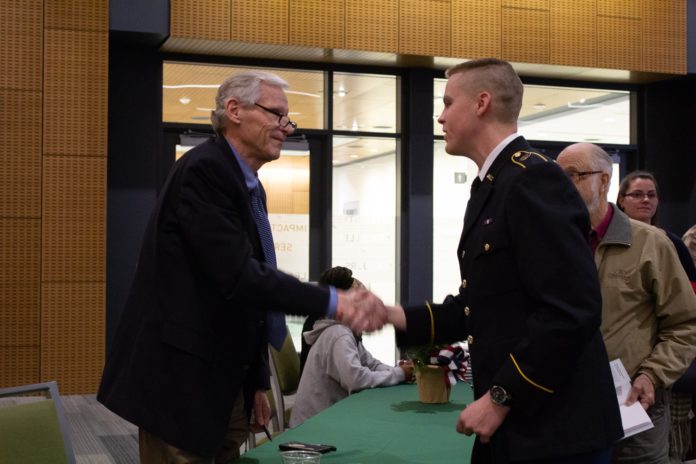
By Taylor Wolf | Social Media Editor
On Tuesday night, the Texas Collection presented its spring lecture “On Changing Tides: Doris Miller, Pearl Harbor and the Civil Rights Movement,” featuring Dr. T. Michael Parrish, who explored the life and legacy of African-American Waco native and WWII hero Doris Miller as an icon of the early civil rights movement.
Miller was raised in a region that is now covered by Lake Waco and he enlisted in the Navy in September 1939 during the Great Depression. More notably an athlete than a student, Miller was not able to pass the Army entrance exam.
Parrish, the Linden G. Bowers Professor of American History, stressed the importance of creative context and looking at the big picture of the war and civil rights movement. Doing so, the impact of Miller’s legacy would be transparent.
“I think it’s important to recognize that the civil rights movement is ongoing – that it has a long history of struggle. African Americans themselves have called other Americans to put up real commitment into the ideals — the so-called American creed of life, liberty, pursuit of happiness and equality — and to honor the Constitution as the best way to guarantee those blessings as the Founding Fathers described them,” Parrish said. “By living up to those ideals, we do service to all Americans, not just African Americans, people of color and others who have suffered from discrimination. We honor, affirm and strengthen all Americans as a result of that endorsement.”
Parrish explained that Miller, who was a messman at the time, was awarded the Navy Cross for his heroism during the Pearl Harbor attack on December 7, 1941, but that most importantly he was a catalyst to the civil rights movement.
“Miller optimized, or rather personified, the courage, the selflessness and the patriotism that is really required to honor the ideals of the American creed,” Parrish said.
Contrary to some cinematic depictions (such as the films “Pearl Harbor” and “Tora! Tora! Tora!”) and wildly held beliefs, research indicates that Miller didn’t actively shoot down any Japanese airplanes during the battle of Pearl Harbor. However, Parrish said that his courage and instinct to fight and protect men who weren’t considered his equals is what memorializes his efforts.
According to Parrish, in 1941, the Navy was the most segregated branch of the military, giving the most demeaning and demoralizing positions to minorities. Miller served as a messman, which is a steward’s assistant is an unlicensed, entry-level crew member, on the battleship USS West Virginia at Pearl Harbor.
Parrish explained that whites and minorities metaphorically served in completely separate worlds in the army. He used the example of his own father who served in the Navy at Pearl Harbor and had never heard of Miller until moving back to Waco in the ‘60s.
Nevertheless, Parrish said that when the Japanese planes torpedoed and dive-bombed ships at Pearl Harbor, Miller, with his initiative and disposition to protect, manned battle stations and helped in the transportation of his mortally wounded captain.
After the attack, word spread and papers such as the Pittsburg Courier were pushing the war efforts of African-Americans of the heroism of the “unnamed messman,” into civil rights momentum; however, the Navy initially refused to identify Miller.
Parrish said that Congress and the NAACP pushed for Miller’s name release and the Pittsburg Courier named him “the first black hero of WWII.” Later, Congress, the White House and the NAACP pushed for Miller to receive Navy Cross, which he did.
Parrish said that when Miller returned home, he became an icon, used to encourage black enlistment and promote “publicity, participation and encouragement for African-Americans to rise through the ranks.”
Miller returned to duty as a ship’s cook, third class and was killed at Tarawa. His parents were notified on December 7, 1943.
In 1973, the USS Doris Miller, named in honor of Miller, was the first ship to carry the name of a black enlisted man. In 2010, he became the face of a postage stamp. Most recently, Waco erected a statue in his honor that is the centerpiece of what will become the Doris Miller Memorial on the Waco river walk.
The Doris Miller Memorial on the banks of the Brazos River is in the process of completion. According to the website, the purpose of erecting the memorial is to honor Doris Miller and include a place for remembrance, reflection and learning.
Professor of History, Dr. Julie Anne Sweet was enlightened by Parrish’s presentation. She said she learned that there was much more to his impactful story than even she knew as a deeply passionate history professor with Navy family ties.
“I didn’t realize how pivotal he was to the whole desegregation and his importance to the African-American sailors in general,” Sweet said. “I knew he was an important guy —I just didn’t ever think about how he resonated so much and in so many different ways.”
Parrish based his presentation on his book “Doris Miller, Pearl Harbor and the Birth of the Civil Rights Movement,” upon which there was a book signing at the end the event.
Parrish also has a podcast episode through Baylor Connections dedicated to sharing how Miller’s heroism remains to be felt to this day, which can be accessed here.





